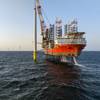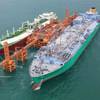According to the association that represents America’s offshore workboat industry, crew shortages are a major concern for maritime companies, but the industry should not lose sight of the fact that careers at sea offer American workers opportunities that they may not find in other jobs. Carl Annessa, Executive Vice President and Chief Operating Officer, Hornbeck Offshore Services, Inc., will testify on behalf of the Offshore Marine Service Association (OMSA), before the Subcommittee on Coast Guard and Maritime Transportation of the U.S. House Committee on Transportation and Infrastructure, on Wednesday, October 17, 2007. In his testimony, Mr. Annessa will address the following, and will offer suggestions for improvement:
-- The maritime professions offer a skilled, attractive career path for Americans. Training is provided by companies and is available when the mariner is ready to progress. Pay scales are well above most landside wages and often the maritime industry offers a way for people that may be residing in depressed areas to find quality jobs without having to relocate.
-- The requirement for qualified maritime personnel will be ongoing into the future. According to an OMSA member survey, hundreds of new mariners will be needed in the just the offshore energy service vessel sector as new boats are built over the next five years.
-- The aging workforce is a major concern to the maritime industry. Based on OMSA data, 40 percent of members’ licensed officers are over the age of 50, meaning that within five to10 years they will be nearing retirement age. Since it may take 10 years for a mariner to advance to become a vessel captain, the industry must begin addressing this potential shortfall now. Working with the Coast Guard on fitness for duty standards that make sense and developing mariner wellness programs will be part of this equation.
-- Training should be designed to assist the mariner to progress up the career ladder. OMSA provided an outline of what they feel is an effective training for the industry.
-- International Standards for Training Certification and Watchkeeping Code (STCW) interpretations have been an obstacle to advancing mariners. These standards, which focus on worldwide training and skill requirements, were developed by the international community with big ship, ocean-going operations in mind, and have been force fit for mariners who work on smaller coastal vessels that may not require the same standards of certification.
-- Coast Guard licensing reform is showing success, but more is needed. The current Coast Guard licensing process remains cumbersome and has hindered the ability to recruit and retain quality crews.
-- A pilot project between the government and maritime industry could assist the maritime industry and depressed communities. OMSA urges Congress to help build effective partnerships between vessel companies and economically depressed areas.
A system that helps mariners climb the career ladder is the key. Mr. Annessa said, “Our approach to our personnel needs is organized around the concept that our employees will advance and rise in their profession as quickly as their ambition and access to training permits. As one company human resources director says, ‘When I hire entry-level employees, I don’t look for deckhands. I look for future captains.’ For Americans coming into our industry, the opportunity for advancement is defined by their individual skill, energy and dedication. They are rewarded based on their abilities and drive. That is a very American concept and it is something that is worth celebrating and worth defending.”
Subscribe for
Maritime Reporter E-News
Maritime Reporter E-News is the maritime industry's largest circulation and most authoritative ENews Service, delivered to your Email five times per week










